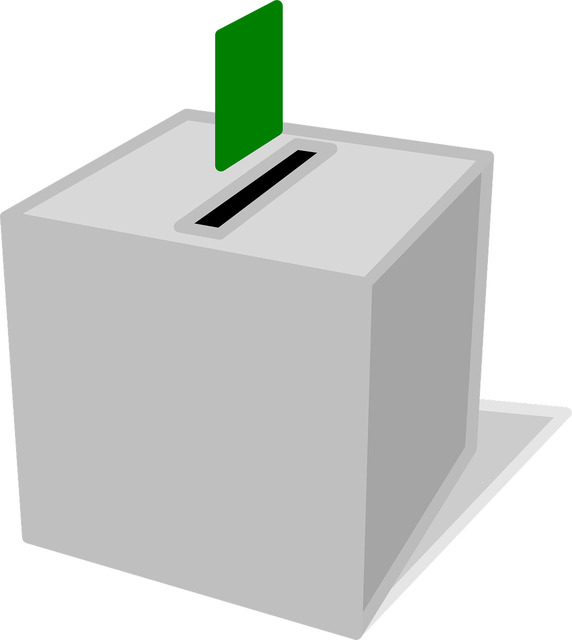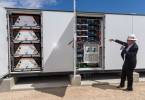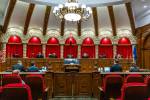Voting on issues, leaders is our responsibility
Green living involves individual choices, including voting. Lately, I have spent many afternoons in front of stores offering to help register voters.
I often hear people say they will not vote and their vote does not matter. This year, more than ever the frustration is understandable. However, while election-mania heats up, so does our planet.
The National Oceanic and Atmospheric Administration and NASA reported this summer as being the hottest on record, and this year, for the first time in human history, our CO2 levels have remained above 400 parts per million. That is something that matters!
Reducing our consumption and energy use, reusing or repairing the things we already own and recycling as a last resort are all doable tasks and necessary habits to develop. However, we are also in need of speedy, top-down solutions where governments (local and federal) legislate, regulate and/or incentivize in ways that help us as consumers and citizens of this planet.
Voting on initiatives and choosing responsible leaders is our right and our responsibility.
Minimizing impact
According to Green Chips, which published the Southern Nevada State of Sustainability Report 2016, minimizing the impact that cities have on the environment “is of the utmost importance for developing into the future. This includes initiatives to preserve air quality to promote healthy and clean living for residents and minimizing the region’s global footprint by reducing contributions to air pollution and climate change.”
What better way than to promote clean, renewable energy.
The Energy Choice Initiative on the November ballot is one such initiative. Ballot Question 3 is a constitutional amendment aimed at discontinuing the long-running constitutionally mandated utility monopoly.
This initiative would require the state legislature to “provide by law an open, competitive retail electric energy market with protections that entitle customers to safe, reliable, and competitively priced electricity.” This would give businesses and citizens the right to choose what energy providers they want or even become their own energy provider with rooftop solar.
Nevadans have a history of self-determined individualism and this initiative can give power to citizens and entrepreneurs to be trailblazers in acquiring abundant sunshine and other types of renewable energy and increase jobs as well.
Since this initiative is in the form of a constitutional amendment, it will need to be voted on twice — once in this election and then again next election. At that point, if it passes two times, then the legislatures must create the details of the law. Unless, of course, if it passes this year, the newly elected state legislature could decide to not waste time and make the law in the next session. One can only hope.
It can be done
In a short film called “The Disruptors,” produced by the Economist, it shows that in a region of Germany, a major utility company, called Eon, had seen income from fossil fuel fall by a third since 2008. This company, like NV Energy, was a monopoly — the only power company that residents and businesses could choose from.
Over the past decade, more and more citizens and businesses began creating their own energy from solar, wind and bio-mass. Instead of resisting the needed change, Eon made a drastic decision to commit to the renewable revolution. The company realized a green society needs to be managed. It is now in the perfect position to move with technology and manage an open-market grid.
Voting for leaders
In addition to Nevada’s energy initiative, the most vital choice we have is choosing leaders that not only respect our natural resources but respect our choices by planning for a sustainable future in reliable, safe energy sources. Many Americans depend far too much on getting their information about candidates solely from paid ads and flyers bulging from our mailboxes. This can be discouraging and one-sided.
There is no better way to find out more about the candidates than to call or write them. This means making a list of candidates (both parties) for county, state assembly, state senate, House of Representatives, U.S. Senate and president. Most have websites with their positions, and some may even answer your call.
Renewables increase around the globe
This year, Stanford University boasts that 65 percent of its energy comes from solar. Cloudy Great Britain produced more electricity from solar than coal. India’s cost of solar has dropped 40 percent in the last 18 months, and it now has plans to cross the continent with fully solar-powered electric trains.
Even war-torn Yemen, one of the poorest countries in the world, had a 2,000 percent increase in solar panel sales. Nevada, too, should be leading the way, especially with rooftop solar.
The pace of renewable energy development and use is moving ahead around the world, with or without the United States. Many citizens around the world do not have the awesome privilege and responsibility of voting and direct democracy and, yet, their governments and businesses are using rational choice to move toward a sustainable future. The United States should be leading this movement.
We have two choices: sit back and complain or educate ourselves on the direct choices we have, ballot initiatives and choosing our representatives.
Mary Beth Horiai has split her adult life between Japan and Southern Nevada. In Las Vegas, Horiai works for the nonprofit, Green Our Planet. A graduate of UNLV, she was trained as a speaker for The Climate Reality Project and also teaches part-time at College of Southern Nevada. For more information and links to additional resources relating to this column, visit www.driverofchange.net.




























